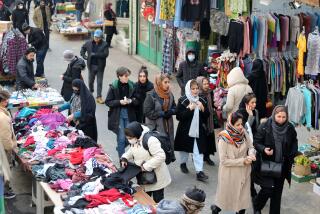Zimbabwe’s Money Crunch
- Share via
MBERENGWA, Zimbabwe — Highways are clogged by roadblocks as police conduct lengthy searches for currency before a revaluation of the Zimbabwean dollar aimed at reining in the country’s hyperinflation.
Mourners say they have been forced to open coffins, and some women say they have had to submit to body cavity searches.
The Reserve Bank of Zimbabwe lopped three zeroes off the currency more than two weeks ago and gave people until Monday to exchange their old notes. It also put a strict limit on how many notes can be exchanged each day.
The government of President Robert Mugabe blames currency hoarding for the country’s economic problems. Mugabe warned Tuesday that the government would crack down on any violent protests when the old currency expired, state radio said.
Zimbabwe’s economy, once one of the strongest in Africa, has been in a free fall for five years. The country faces severe shortages of foreign currency, fuel, food, medicine and basic goods. The problems began when the once-rich agricultural sector collapsed after Mugabe redistributed land on large farms, many of which were white-owned.
Mugabe, who has ruled Zimbabwe since its independence in 1980, accuses Britain and other Western governments of sabotaging his country. His critics accuse him of ruining the backbone of the economy and then printing money to meet a demand for cash, sparking hyperinflation.
Before the devaluation was announced, the official exchange rate was 250,000 Zimbabwean dollars to one U.S. dollar, but the black market rate was 555,000. Since then, the black market value of the Zimbabwean currency has declined sharply as dealers try to dump it.
Police and youth militias of the ruling Zimbabwe African National Union-Patriotic Front, or ZANU-PF, are confiscating cash from anyone carrying more than 100 million in old currency.
“They government is trying to rob us of our hard-earned cash,” Thomas Matumbura said at a roadblock in Landela, south of Harare, the capital. He said his family was forced to open the coffin of his older brother, Tinos.
Shuvai Mpofu, 43, a widow in Mberengwa, about 250 miles south of Harare, said she lost her savings last week when ZANU-PF youth militias conducting door-to-door searches took 200 million Zimbabwean dollars.
“I had sold two cattle to pay for school fees for my two daughters,” she said. “They harassed me and accused me of sabotaging the economy, and they did not give me a receipt.”
At a roadblock outside Masvingo, about 300 miles south of the capital, Ozias Mutuwe, who runs a bottle store in a nearby town, said he bribed police after he and his business partner were picked up while on their way to deposit their daily earnings.
“We ended up paying 50 million to the police manning the roadblock so they’d let us go. Mugabe is creating criminals,” said Mutuwe, who is in his early 20s.
Tensions are running high.
A businessman, Tichaona Muchabaiwa, was charged with insulting the president Friday after he lost his temper at a roadblock and allegedly began shouting about Mugabe.
In a speech Monday, Mugabe attacked “economic saboteurs” and people who “worship the god of wealth and who have shown unbridled greed, corruption and self-aggrandizement,” the official newspaper the Herald reported Tuesday.
Mashanu Jacob, a financial trader interviewed in Harare, said black market currency dealers were desperate to unload their old currency before Monday’s deadline.
“They are trying to make us ordinary people into scapegoats. They have destroyed the economy and they are turning the blame onto everyone else,” he said.
Reserve Bank chief Gideon Gono said recently that only 12.5% of the nation’s currency flowed through the banking system, and the rest remained in a shadow economy. The Reserve Bank has seized trillions of Zimbabwean dollars, including one haul of 10 trillion being smuggled into the country at Harare Airport.
Some economists warn that the devaluation could cripple the informal economy, which has become the mainstay of economic activity.
Bernard Mafute, director of the Confederation of Zimbabwe Industries, welcomed the devaluation because businesses were unable to cope with huge sums in transactions. But he called on the government to introduce a realistic exchange rate.
John Robertson, an economist in Harare, said the devaluation meant people would no longer have to carry sacks of cash to the supermarket, but it did nothing to address Zimbabwe’s fundamental economic crisis.
He said the militias and police at roadblocks were “literally robbing people of their money.”
“People know they’re being cheated and harassed,” Robertson said.
He said as long as the government continued printing money, inflation could rise from 1,000% to 2,000% by the end of the year.
“You can carry on going downhill indefinitely,” he said, adding that some people, particularly those connected to the government, could get rich manipulating the economy.
“There are houses being built in Harare that you would not expect to be seen outside Hollywood,” he said.
*
Special correspondent Chibaya reported from Zimbabwe and Times staff writer Dixon from Johannesburg, South Africa.
More to Read
Sign up for Essential California
The most important California stories and recommendations in your inbox every morning.
You may occasionally receive promotional content from the Los Angeles Times.












